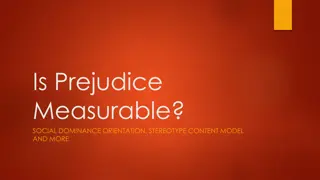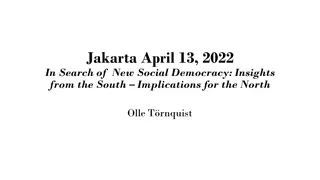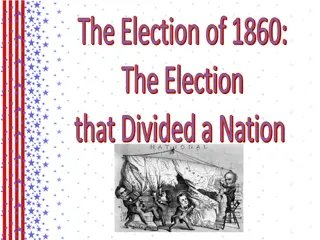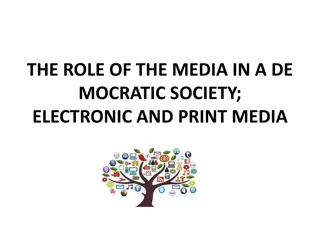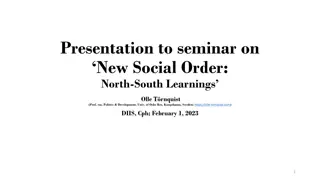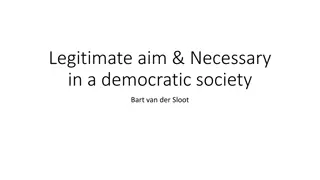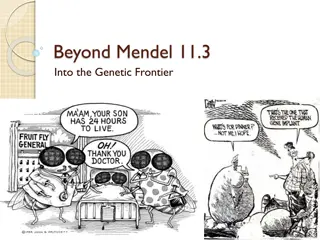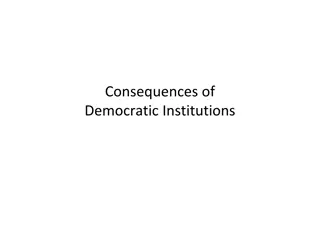ABUSE OF DOMINANT POSITION
Carishma Singh explains how abuse of dominant position (Section 4) is defined under the Competition Act, emphasizing that dominance alone is not anti-competitive, but coupled with abusive conduct, it can harm competitors, consumers, and markets. The law applies to both private and government entitie
0 views • 20 slides
The Journey Begins
Initiatives like Voter Education, Deliberative Dialogue, and addressing Global Challenges are pivotal in fostering civic engagement and informed citizenship. The Theory of Change underscores the importance of integral, relational, organic, and generative approaches in democratic engagement efforts,
0 views • 16 slides
Understanding Measures of Prejudice in Research: Social Dominance Orientation, Stereotype Content Model, and More
Explore methods for measuring prejudice in research, including explicit and implicit attitude measures, Social Dominance Orientation (SDO) scale, and Symbolic (Modern) Racism Scale. Learn about the aims of research, selecting appropriate methods, and theoretical frameworks to apply.
0 views • 12 slides
Connecting the Future Soldier with Technological Resources for Information Dominance
Panel discussion on the integration of computer hardware, enterprise software, and solutions for the future soldier's information dominance. Overview of ITES-3S and RS3 contracts providing IT support and professional services for the Army. Comparison of ACCESS and ITES-4S focus areas and evaluation
0 views • 6 slides
Democracy in the EU and Upcoming European Elections Overview
Explore key findings on the state of democracy in the EU, upcoming European elections, and global trends. Europe remains a high-performing region, with Central Europe showing notable democratic growth. Discover how the EU acts as a countervailing institution and challenges faced by strong democracie
0 views • 15 slides
Understanding Active Citizenship & Civic Engagement: Definitions and Importance
Encouraging citizens and organizations to actively participate in civil society and decision-making processes is vital for a democratic society. Active citizenship involves participation in public affairs, civil society, and political life with a focus on human rights, democracy, and community well-
1 views • 22 slides
Evolution of Modern State: Three Macro-Patterns Explored
The evolution of the modern state is influenced by three key macro-patterns: War and Militarism, Emergence of Capitalism, and Struggle for Citizenship. These patterns involve deep processes of change over long periods, contributing to the development of modern liberal democratic states. War and Mili
0 views • 13 slides
Understanding Incomplete and Co-dominance in Genetics
Phenotypes and genotypes play crucial roles in understanding incomplete dominance and co-dominance. In incomplete dominance, alleles blend to produce a new phenotype, while in co-dominance, both alleles are expressed equally. Examples and problems illustrate these concepts further, aiding in genetic
0 views • 12 slides
Indian Constitution and Human Rights: A Comprehensive Overview
The Indian constitution embodies justice in social, economic, and political spheres, aiming for the full development of every individual. Rooted in democratic principles and socialism, the preamble emphasizes liberty, equality, and justice. Drawing wisdom from leaders like Dr. Ambedkar and Mahatma G
0 views • 10 slides
Understanding Genetic Markers in Molecular Mapping
Genetic markers play a crucial role in gene mapping within molecular biotechnology. They are fragments of DNA associated with specific genomic locations, aiding in identifying DNA sequences and analyzing genetic variation. Various types of genetic markers such as RFLP, SSR, and SNP offer insights in
1 views • 26 slides
Insights into the Evolution of Social Democracy in the Global Context
Exploring the challenges and transitions in social democracy from both Northern and Southern perspectives, this research delves into the complexities of needs-driven development based on social justice through democratic means. The author reflects on the decline of social democratic movements and pr
0 views • 15 slides
The Election of 1860: A Divisive Campaign for the Future of the United States
The 1860 election was a significant moment in American history, marked by ideological divisions and the rise of Abraham Lincoln. The Republican Party, Southern Democratic Party, Democratic Party, Northern Democratic Party, and Constitutional Union all played crucial roles in shaping the outcome. The
1 views • 14 slides
The Role of Media in a Democratic Society: Electronic and Print Media Overview
Media plays a crucial role in a democratic society by informing, entertaining, and educating the public. Both electronic and print media provide news, entertainment, and valuable information to society, highlighting events, promoting open debate, exposing violations, and shaping public opinion. The
3 views • 19 slides
Understanding Multiple Alleles in Genetics
Explore the concept of multiple alleles in genetics through examples like pea color inheritance and human blood types. Learn how multiple alleles create various phenotypes and genotypes, illustrating concepts of dominance, recessiveness, and co-dominance in genetic inheritance.
0 views • 15 slides
The Era of Good Feelings and Westward Expansion in Early 19th Century America
The Era of Good Feelings (1817-1823) marked a period of national unity and political agreement in the United States, leading to a focus on expansion and development. This era saw significant diplomatic achievements and a surge in westward migration, particularly to areas like the Old Northwest and O
0 views • 19 slides
Cooperative Ownership and Democratic Participation in Economic Models
Explore the principles of cooperative ownership, democratic participation, and economic models as advocated by Jessica Gordon-Nembhard. She emphasizes the historical significance of collective work, indigenous cooperative efforts, and the values of shared risk and surplus sharing in community-owned
0 views • 71 slides
Insights into Voting Systems and Arrow's Impossibility Theorem
The content delves into various voting systems, including the conditions necessary for a voting system to be fair and democratic. It discusses the challenges faced by democratic voting systems, such as Arrow's Impossibility Theorem, which states that no voting system can satisfy all desirable axioms
0 views • 20 slides
Strategies for Interim Injunctions in Abuse of Dominance Cases
This mini-series event focuses on strategies and tips for interim injunctions in abuse of dominance cases, chaired by Sir Richard Aikens. Various perspectives are explored, including a claimant's viewpoint by Aaron Khan, document requirements by David Heaton, and insights from Fergus Randolph QC as
2 views • 23 slides
Understanding Dominance in Genetics: The Role of Alleles and Phenotypes
Dominance in genetics refers to the interaction of alleles at the same gene locus. Complete dominance occurs when one allele masks the effect of another in a heterozygous genotype, leading to a phenotype indistinguishable from the dominant homozygote. This concept is crucial for predicting genetic o
1 views • 18 slides
Understanding Coronary Artery Anatomy and Dominance
Explore the intricate details of coronary artery anatomy with a focus on the right and left coronary arteries, as well as variations such as large right dominance, small right dominance, co-dominance, and left dominance. Learn about the importance of understanding these structures in relation to car
0 views • 8 slides
Social Democratic Politics: Pillars and Strategies for Transformation
Social democratic politics is rooted in democratic collectivities and rights, aiming to reshape capitalism through reform, regulation, and transformative strategies. Olle Törnquist delves into the historical foundations and the need for comprehensive reforms to challenge the dominant logics of capi
3 views • 10 slides
Understanding Social Hierarchies in Animal Behavior
Social behavior in animals involves living in social groups, establishing social hierarchies, and exhibiting dominance behaviors. Animals have developed various signals and behaviors to interact successfully within these groups. Social hierarchies offer advantages such as increased chances of surviv
1 views • 20 slides
Understanding Dominance Rule in Data Analysis
Dominance rule in data analysis involves identifying and attributing information to dominant observations that account for a majority of a measure. Concentration ratios, like Herfindahl Indices, can reveal dominant players in various sectors. Dramatic changes in time series data may also indicate do
4 views • 6 slides
Exploring Values Education in Nordic Preschools
This study delves into the perception and handling of values in Nordic preschools, focusing on caring, disciplinary, and democratic values. It aims to uncover whether conflicting or co-existing values prevail within individual preschools and across Nordic countries. Definitions of values, including
0 views • 16 slides
Challenges to Democracy: An Historical Perspective
Explore the historical instances of democracy being interrupted in Ancient Athens, from the Periclean Peloponnesian War to the oligarchic regimes of 411 and 403 BC. Delve into the reasons behind the dissolution of democracy, the responses of Athenians to such interruptions, and the oligarchs' aims t
0 views • 24 slides
Dynamics of Democratic Nation-States and Organizational Change
Insights on the emergence of democratic nation-states, the role of networks in democratic revolutions, challenges in defining democratic governance, and the impact of redundancy on organizational stability and change are explored in this thought-provoking discussion by Elisabeth Clemens.
0 views • 25 slides
Democratic Lawmaking in the EU: Promises and Pitfalls of the Ordinary Legislative Procedure
This presentation explores the evolution and impact of the Ordinary Legislative Procedure (OLP) in the European Union, discussing its democratic innovations and achievements post-Lisbon. Topics covered include the implementation of OLP, its democratic implications, and the use of trilogues as negoti
0 views • 11 slides
Legitimate Aims in a Democratic Society - Exam Preparation Overview
Exam preparation on legitimate aims in a democratic society focusing on Article 8 of the ECHR, including the right to respect private and family life, security concerns, national security, public safety, prevention of disorder or crime, and more. The content covers necessary aspects for understandin
0 views • 70 slides
Challenges of Democratic Governments in Economic Policy Making
Democratic governments face challenges when enacting economic policies due to the influence of voter participation, special interest politics, and the limitations of majority rule. This presentation explores the complexities of democratic decision-making in economic matters, examining the impact of
0 views • 20 slides
United States Foreign Policy: Past, Present, and Future
The post-war period marked the rise of the United States as a key player in international relations, driven by ethical and democratic principles. Today, the US foreign policy focuses on maintaining global dominance, combatting terrorism, upholding economic interests, promoting democracy, and seeking
0 views • 16 slides
The Conservative Resurgence in the 1980 Presidential Election
The 1980 presidential election marked a significant shift in American politics, with Ronald Reagan's victory representing a resurgence of conservative values and the end of the New Deal coalition. This period saw social, political, and economic upheaval, leading to a polarization of perspectives and
0 views • 7 slides
Nurturing Democratic Life Skills in Children: A Guide to Promoting Positive Development
Explore the concept of Democratic Life Skills (dLS) and the essential guidance needed to cultivate these skills in young children. Learn about the educational outcomes for a democratic society and the historical and psychological roots of dLS. Discover how to support children in finding acceptance,
0 views • 14 slides
Understanding Genetic Inheritance Patterns and Human Blood Types
Explore how genes can be inherited based on patterns such as Mendel's dominance, incomplete dominance, co-dominance, and multiple alleles. Dive into the complexities of human blood types controlled by one gene with three alleles - A, B, and O, resulting in four phenotypes and six genotypes. Learn ho
0 views • 19 slides
Understanding Monohybrid Crosses: Incomplete Dominance and Codominance
Explore the concepts of incomplete dominance and codominance through monohybrid crosses. Learn how alleles interact to produce unique phenotypes in plants and horses. Discover the outcomes of crosses between homozygous dominant, heterozygous, and homozygous recessive individuals. Gain insights into
0 views • 7 slides
Understanding Genetics: Mendel's Experiments and Inheritance Patterns
Delve into the world of genetics through Mendel's groundbreaking experiments with pea plants, exploring traits inheritance, Punnett squares, dominant and recessive alleles, incomplete dominance, and co-dominance. Gain insights into how traits are passed from parents to offspring and predict offsprin
0 views • 9 slides
Game Theory Concepts and Models in Strategic Decision-Making
Exploring various solution concepts and game models in the realm of game theory, this presentation delves into topics such as Nash equilibrium, dominance, dominant strategy equilibrium, mixed strategies, and iterated dominance. It discusses how players decide on particular equilibria, possible solut
0 views • 39 slides
Analysis of Democratic Dominance in Presidential Elections and Potential Senate Seat Flips in 2016
Democratic candidates have consistently won Democratic stronghold states in presidential elections since 1992, securing a significant portion of the Electoral College votes. Meanwhile, Republicans face challenges in holding onto Senate seats in states like Illinois, Wisconsin, New Hampshire, Pennsyl
0 views • 8 slides
Russian Economic Warfare in Central and Eastern Europe: Challenges and Impacts
Russia employs overt and covert economic warfare tactics in Central and Eastern Europe, including energy blockages and media manipulation. This strategy poses challenges to democratic values and institutions. The study examines the correlation between Russia's economic footprint and democratic stand
0 views • 24 slides
Perspectives on Democratic Institutions: Majoritarian vs. Consensus Vision
Democratic institutions have consequential impacts on political representation, economic policy, ethnic conflict, and democratic survival. Two distinct visions, majoritarian and consensus, shape the distribution of power in governance. The majoritarian vision concentrates power in the hands of the m
0 views • 112 slides
Foundations of Democratic Governance: From Ancient Roots to Modern Principles
Explore the evolution of democratic governance from the foundations laid in Ancient Greece and Rome to the core principles of Enlightenment thinkers and English influences, culminating in the establishment of democratic principles in the Declaration of Independence and the American Constitution. Dis
0 views • 10 slides


